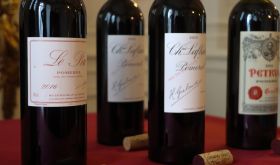When Nigel Jagger bought an old mine-turned-munitions factory in Wiltshire in the late 1980s he considered the act “just within the bounds of sanity” and was so worried that he gave power of attorney to his solicitor. His chief concern was how on earth he was going to fill this inconveniently damp storage facility the area of 20 football pitches. When he bought it it contained just 80,000 cases of wine parked in various dripping corners. He and his staff considered approaching mushroom growers and cheesemakers to fill the space.
Today Corsham Cellars’ various caverns carved out of rough grey stone and dried by giant computer-controlled dehumidifiers is piled high with 725,000 manly wooden cases of fine wine and Jagger is not quite sure how the anticipated net gain of 100,000 cases of 2005 red bordeaux which will be delivered next year will fit into this extraordinary trove of a significant proportion of the world’s finest bottles – most of them years from being ready to drink.
The hugely successful 2005 vintage, bought heavily by collectors and, especially, investors, is putting space pressure on the world’s relatively few specialist wine storage companies. Corsham’s main UK rival London City Bond has just stepped up its charges for its fine wine facility, the Vinothèque Victorian warehouse in Burton-on-Trent. Jagger’s logistics company Cert Octavian is responding by launching a new, premium service for Corsham customers, slightly more expensive than the old one but offering specially authenticated certificates of “pristine storage” and fancy new literature that makes much of Corsham’s extraordinary natural attributes. “I just feel stupid for not doing it before,” says Jagger, while admitting, “if people refuse the new system, we may not be able to guarantee storage at Corsham forever.”
The hugely successful 2005 vintage, bought heavily by collectors and, especially, investors, is putting space pressure on the world’s relatively few specialist wine storage companies. Corsham’s main UK rival London City Bond has just stepped up its charges for its fine wine facility, the Vinothèque Victorian warehouse in Burton-on-Trent. Jagger’s logistics company Cert Octavian is responding by launching a new, premium service for Corsham customers, slightly more expensive than the old one but offering specially authenticated certificates of “pristine storage” and fancy new literature that makes much of Corsham’s extraordinary natural attributes. “I just feel stupid for not doing it before,” says Jagger, while admitting, “if people refuse the new system, we may not be able to guarantee storage at Corsham forever.”
Now that the humidity has been taken down to below 75%, conditions in Corsham Cellars, recently renamed Octavian Vaults, are admittedly close to ideal. The caverns are 90 feet underground resulting in a constant temperature of about 13.5 deg C/56.3 deg F. They can be reached only by two heavily guarded, half-mile shafts, one of them serviced by a small, lumbering hydraulic-powered train that transports wine in and eventually out of the cellars. Visitors, all of whom have to carry an ancient gas mask and a torch since the property is still officially classified as a mine, have to make the ascent on foot, and only the fittest could even contemplate carrying a case full of wine with them.
Jagger’s real interest is sailing – he took 10 years away from his logistics company to invent an underwater video camera called Spyfish – and seems to have woken up only relatively recently to the value and uniqueness of what he owns under the Wiltshire turf. It has hit him now that not even the United States can boast such sizeable and convenient storage conditions. Different US state laws on alcoholic beverages and the relatively nascent fine wine market there mean that American wine storage is generally above ground in purpose built, expensively cooled, modern warehouses (with the exception of Jed and Amie Benedict's underground Horse Ridge Cellars in Connecticut, build to withstand an indirect hit from a nuclear warhead), none of which has anything like the capacity of Corsham – yet. (The most unexpected professional wine storage facility I have yet to encountere is the extended warehouse attached to a Trappist abbey used by many Oregon wine producers, but the brothers can hold only a third as much wine as Corsham.)
Cert Octavian, which owns several other more mundane warehouses including one in Hoddesdon dedicated to bottles that do not have to be stored for decades, is currently storing wine at Corsham for about 200 wine merchants and their customers, plus about 1,900 individuals who have accounts directly with Octavian. Of leading UK wine merchants only Berry Bros in expanding modern warehousing in Basingstoke (always referred to as ‘our Hampshire cellars’), Seckford in Ipswich and The Wine Society in Stevenage offer their customers their own storage facilities. Storage is a headache for most merchants and they have been delighted to hive off the work to the logistics professionals, charging their customers very varied fees for this service. Corsham has been regarded as the Rolls Royce of storage facilities but prices are much higher for individuals with their own accounts than for those who store using a merchant’s trade account. See the table below.
Nevertheless, as Jagger points out, for fine wine which can be damaged if exposed to high temperatures and which is believed to mature most satisfactorily at a steady 55 degrees F (the Napa Valley has a storage facility called 55 Degrees), provenance and storage conditions are crucial to its value. A wine known to have crossed the Atlantic twice is likely to raise a much lower price at auction than one that has moved only once in its life, from château to reliably cool wine warehouse.
Many of the wines at Corsham have moved several times just a few yards between different owners’ stacks in Corsham, through sales either at the auctioneers or via merchants from one customer to another. One of the merchants’ perks for acting as nominal warehousemen has been the commission earned on such transactions, which is why they are concerned at signs that both Cert Octavian and London City Bond might be trying to muscle in on this bit of their business.
For the moment, the Corsham staff are relatively light on wine knowledge (Nigel Jagger told me that the photographs for his new literature were being taken at ‘Andrew’ Barton’s château in Bordeaux; we winos know him as Anthony) and most merchants have little expertise in the practical aspects of storage and moving wine. While both of the principal specialist wine storage companies have been beefing up the information they provide to their customers, including some form of online service (not nearly as sophisticated as some of their American counterparts), wine collectors can be frustrated by the stock lists they receive with their ‘Pul Mont Cl 2002’ instead of the more helpful ‘Domaine Leflaive, Puligny Montrachet Les Clavoillons 2002’. Mark Bevan of Nexus Wine spotted a gap in the market here and offers those with substantial private collections a logistics service run by someone who really understands wine. He generally recommends that his customers use Octavian. “Any individual can open their own account at Octavian but many have found it quite burdensome. The warehouses are geared up to be trade-to-trade really. We keep a full record of where you bought it, how much it’s worth etc.”
It is not just the size of the expected fleet of trucks bearing 2005 bordeaux across the Channel that is causing headaches for professional wine storers, but fine wine’s increasing value. One Hong Kong customer checked 30 cases worth a total of more than million pounds in to Corsham the other day. A dropped case, or sometimes bottle, can have a serious financial significance. Not a moment before time, the storers have been looking at the insurance coverage they offer clients, with both Octavian and LCB now offering replacement rather than original value to those who pay for their premium service. It is easy to understand why corkscrews might be outlawed on the premises.
Cameras on the other hand are positively encouraged. As buyers become more and more concerned about authenticity and the precise fill level in bottles (the lower it is the warmer the wine has probably been kept), the warehousemen have special studios in which bottles are photographed before sale. At the moment only a handful of customers, usually overseas ones, ever visit their ‘cellar’ in Wiltshire but Jagger says he has plans to encourage this, even build a clubhouse perhaps. “We could have a temperature-controlled delivery network. We could build a helipad at Corsham. I’ll provide any facility if people will pay for it.”
What it costs to store wine
All these VAT-inclusive prices are for premium service per case per year, supposing a total of 6-30 cases of a dozen bottles are stored in total. There can be substantial reductions for storing larger amounts or choosing an option which does not offer insurance cover at replacement cost. Merchants’ prices quoted are exclusively for wines bought through that merchant.
London City Bond/Vinothèque direct £21.57
Octavian Vaults/Corsham direct £16.65
Armit at Octavian £10.56
Berry Bros (own warehouse) £9.00
Bordeaux Index at Vinothèque £8.81
Corney & Barrow at Octavian £9.17
Farr Vintners at Octavian £8.81
Justerini & Brooks at Octavian £9.00
Lay & Wheeler at Vinothèque £10.57
Nexus Wine at Octavian or Vinothèque £10.58
Private Reserves at Octavian £9.34
Seckford (own warehouse) £6.46
Wine Society (own warehouse) £7.44
For more detail on wine storage, see our recently updated survey of Where to store wine with professionals












